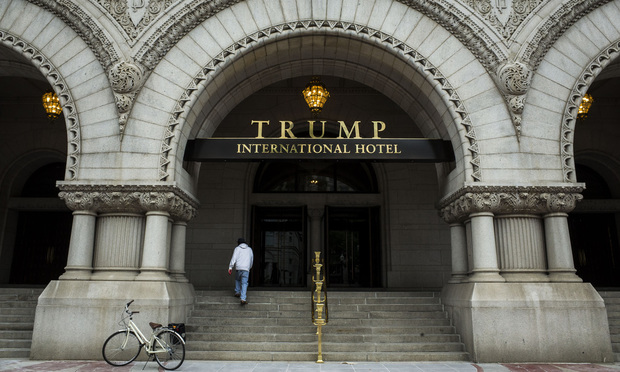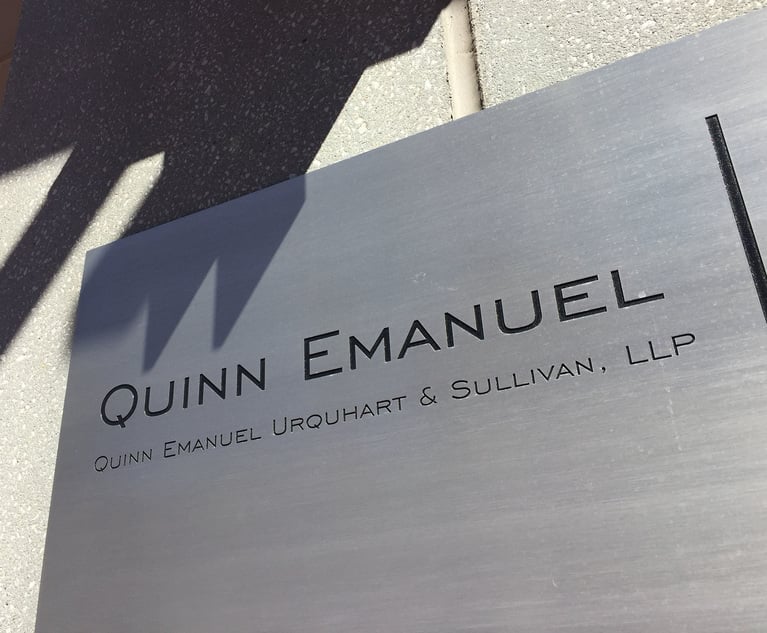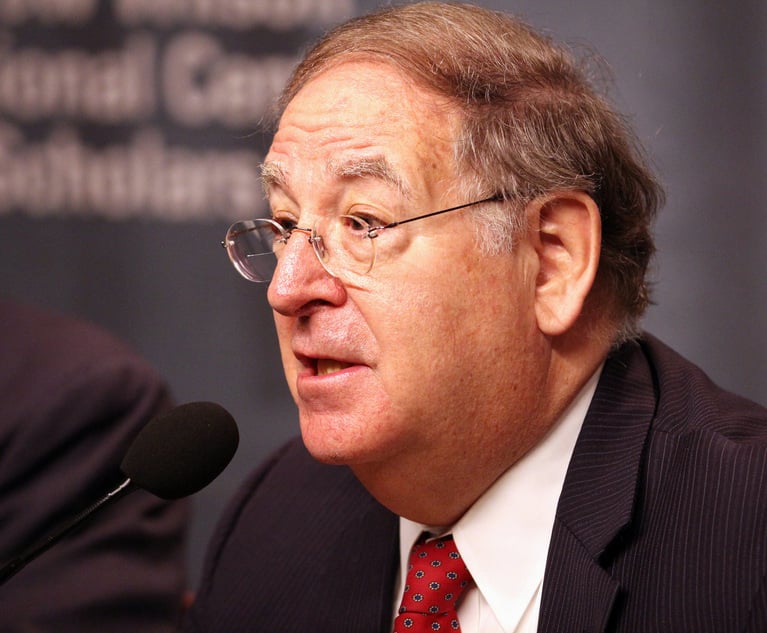4 Key Quotes From Judge Who May OK Trump Emoluments Suit
Over the course of oral arguments that lasted nearly six hours, a federal judge in Maryland appeared likely to allow an emoluments lawsuit against President Donald Trump survive a motion to dismiss.
January 25, 2018 at 07:02 PM
5 minute read

A federal judge on Thursday seemed likely to allow an emoluments case against President Donald Trump over his business ties to move forward despite the dismissal of a similar suit in New York last year.
U.S. District Judge Peter Messitte, an appointee of President Bill Clinton, sat for nearly six hours of oral argument in the case brought by the attorneys general of Washington, D.C., and Maryland. The proceedings in Maryland focused largely on whether the state and district can establish standing to bring their claim that Trump is violating the Constitution's foreign and domestic emoluments clauses when he accepts payments from foreign and domestic governments via his hotels and other businesses.
The emoluments clauses have rarely, if ever, been the subject of litigation in federal courts, and Messitte himself remarked Thursday on the uniqueness of the case. In a similar case brought by private litigants in the Southern District of New York, it was a lack of standing that ultimately led to the suit's dismissal last year.
Given Messitte's statements Thursday, it's possible the state AGs case may escape that fate.
Here's what the judge had to say:
“Don't cite Judge Daniels to me.”
Messitte repeatedly dismissed arguments from Justice Department lawyer Brett Shumate that cited the opinion of Judge George Daniels in New York, who dismissed a similar emoluments lawsuit.
Early in the arguments, Messitte made clear that he did not feel bound by Daniels' reasoning, saying there was “very little analysis” in Daniels' opinion. Later in the arguments, Messitte asked Shumate to cease referring to the opinion altogether.
“Don't cite Judge Daniels to me,” Messitte said, as Shumate began to answer a question about the traceability of the plaintiffs' injury. “You make your own argument, let it stand on its own right here in this court.”
“This is a motion to dismiss now.”
Messitte tussled with Shumate about the stage of the proceedings, often reminding the DOJ lawyer that the decision before Messitte is whether to grant the government's motion to dismiss the case. D.C. Deputy Solicitor General Loren AliKhan and Maryland Solicitor General Steven Sullivan argued that to survive a motion to dismiss, they need only “plausibly” allege that the president's receipt of money from foreign and local governments causes their states an injury.
Shumate said while that's true, the assertion that customers are choosing Trump-owned businesses over others in an effort to curry favor with the president, and that it's harming businesses, is speculative.
But the judge pushed back on the idea that the states needs to provide more evidence at this point. “This is a motion to dismiss now,” Messitte said. “You want it to go out as a matter of law, lock, stock and barrel. I'm not sure we're there. We'll see.”
“I can't really anticipate where a higher court would come out on this.”
One of the judge's main concerns was whether the complaint should have been filed against Trump in his individual capacity rather than in his official capacity as president, because his receipt of profits from his businesses isn't part of his official duties as president.
“They're not challenging a presidential function, they're challenging what the president is doing,” Messitte said of the plaintiffs' complaint.
Asked whether the plaintiffs agreed, AliKahn explained they sued Trump in his official capacity because he is not fulfilling his official duty to not accept “emoluments,” but that if the court preferred, they would gladly amend their complaint. Messitte put the question to Shumate as well, who agreed with AliKahn that the suit could only be brought against Trump in his official capacity.
The judge said he would not order the plaintiffs to amend their complaint, but repeatedly expressed they should consider doing so, because the issue could trip up the case “down the road,” indicating it could have a future.
“I can't really anticipate where a higher court would come out on this,” Messitte told AliKhan. “That's your call, not mine.”
“Your argument seems to just completely destroy the clause.”
One section of the argument focused solely on the “zone of interest” in the emoluments clauses, and whether the plaintiffs' harms fall within the interests the clauses were designed to protect.
Shumate argued the clauses were not designed to protect the state interests the AGs point to, such as not being forced to grant Trump businesses favors in order to stand on a level playing field with other states. He also argued the harm the plaintiffs claim to suffer cannot be traced directly from the president's actions because third parties—such as foreign governments or state agencies—make the decision to patronize a Trump business or not.
The judge pushed back, saying that under the government's theory, it appears there's no plaintiff who can bring a claim to enforce the clauses.
“You seem to be arguing that, because foreign governments always have the choice, that you can't ever enforce the clause,” Messitte said. “Your argument seems to just completely destroy the clause.”
This content has been archived. It is available through our partners, LexisNexis® and Bloomberg Law.
To view this content, please continue to their sites.
Not a Lexis Subscriber?
Subscribe Now
Not a Bloomberg Law Subscriber?
Subscribe Now
NOT FOR REPRINT
© 2025 ALM Global, LLC, All Rights Reserved. Request academic re-use from www.copyright.com. All other uses, submit a request to [email protected]. For more information visit Asset & Logo Licensing.
You Might Like
View All
Trump Administration Faces Legal Challenge Over EO Impacting Federal Workers
3 minute read
Private Equity Giant KKR Refiles SDNY Countersuit in DOJ Premerger Filing Row
3 minute read
Quinn Emanuel Files Countersuit Against DOJ in Row Over Premerger Reporting
3 minute read
'Thoughtful Jurist': Maryland US District Senior Judge Messitte Dies After Short Illness
4 minute readTrending Stories
Who Got The Work
J. Brugh Lower of Gibbons has entered an appearance for industrial equipment supplier Devco Corporation in a pending trademark infringement lawsuit. The suit, accusing the defendant of selling knock-off Graco products, was filed Dec. 18 in New Jersey District Court by Rivkin Radler on behalf of Graco Inc. and Graco Minnesota. The case, assigned to U.S. District Judge Zahid N. Quraishi, is 3:24-cv-11294, Graco Inc. et al v. Devco Corporation.
Who Got The Work
Rebecca Maller-Stein and Kent A. Yalowitz of Arnold & Porter Kaye Scholer have entered their appearances for Hanaco Venture Capital and its executives, Lior Prosor and David Frankel, in a pending securities lawsuit. The action, filed on Dec. 24 in New York Southern District Court by Zell, Aron & Co. on behalf of Goldeneye Advisors, accuses the defendants of negligently and fraudulently managing the plaintiff's $1 million investment. The case, assigned to U.S. District Judge Vernon S. Broderick, is 1:24-cv-09918, Goldeneye Advisors, LLC v. Hanaco Venture Capital, Ltd. et al.
Who Got The Work
Attorneys from A&O Shearman has stepped in as defense counsel for Toronto-Dominion Bank and other defendants in a pending securities class action. The suit, filed Dec. 11 in New York Southern District Court by Bleichmar Fonti & Auld, accuses the defendants of concealing the bank's 'pervasive' deficiencies in regards to its compliance with the Bank Secrecy Act and the quality of its anti-money laundering controls. The case, assigned to U.S. District Judge Arun Subramanian, is 1:24-cv-09445, Gonzalez v. The Toronto-Dominion Bank et al.
Who Got The Work
Crown Castle International, a Pennsylvania company providing shared communications infrastructure, has turned to Luke D. Wolf of Gordon Rees Scully Mansukhani to fend off a pending breach-of-contract lawsuit. The court action, filed Nov. 25 in Michigan Eastern District Court by Hooper Hathaway PC on behalf of The Town Residences LLC, accuses Crown Castle of failing to transfer approximately $30,000 in utility payments from T-Mobile in breach of a roof-top lease and assignment agreement. The case, assigned to U.S. District Judge Susan K. Declercq, is 2:24-cv-13131, The Town Residences LLC v. T-Mobile US, Inc. et al.
Who Got The Work
Wilfred P. Coronato and Daniel M. Schwartz of McCarter & English have stepped in as defense counsel to Electrolux Home Products Inc. in a pending product liability lawsuit. The court action, filed Nov. 26 in New York Eastern District Court by Poulos Lopiccolo PC and Nagel Rice LLP on behalf of David Stern, alleges that the defendant's refrigerators’ drawers and shelving repeatedly break and fall apart within months after purchase. The case, assigned to U.S. District Judge Joan M. Azrack, is 2:24-cv-08204, Stern v. Electrolux Home Products, Inc.
Featured Firms
Law Offices of Gary Martin Hays & Associates, P.C.
(470) 294-1674
Law Offices of Mark E. Salomone
(857) 444-6468
Smith & Hassler
(713) 739-1250










